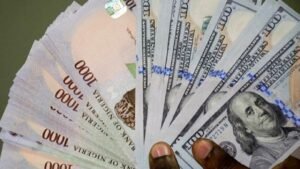Worried by the continuous free fall in the value of the Naira-Nigeria’s currency, President Bola Tinubu last week enjoined Nigerians to Buy–made–in–Nigeriaa goods.
In his understanding, this would strengthen the naira. Countless measures, including what the Central Bank of Nigeria (CBN) called floatation have been introduced to shore up the value of the naira against the dollar,
The floatation of the Naira has created an uproar in the foreign exchange market and in the prices of goods and services. This calls for concern.
Against this backdrop, Ogbodo Ozioma Favour writes on rapid fluctuations of the Naira, the BCD selling at N1300 per $ this week
Naira’s relentless fluctuations have been a cause of concern, over the week Central Bank rates kept fluctuating and as of Wednesday, Naira was buying at N1303.342 and selling at 1304.342 in the official market.

The decline of the Naira
In May 2023, Bloomberg recorded that the Naira tumble reached a record low of N465.06 against dollar which is the biggest drop since 29th December 2022
After the present administrator assumption to office, Naira has witnessed several declines due to float of the naira and different policies by the FG which have continuously affected the price of goods and services creating economic hardship
As of 30th March, Google finance records $ to Naira rate at N1421and CBN rate at N1550

Policies and Exchange Rate causing Economic Downturn
June 2023, barely three weeks after Tinubu removed subsidy on Petrol, the World Bank, in its Nigeria Economic update, disclose that no fewer than four million Nigerians were pushed into poverty in the first six months of 2023, with another 7.1million more expected to join if properly targeted measures are not taken to manage the impact of fuel subsidy removal
Africa Health Report (AHR) reported, the floatation of the local currency, another significant policy shift, introduced exchange rate fluctuations that reverberated throughout the business landscape. While this move aimed to provide flexibility in the foreign exchange market, it led to heightened operational costs for businesses relying on imported goods and materials, amplifying their existing challenges.
Furthermore, the lifting of foreign exchange restrictions had mixed consequences. On one hand, it expanded access to foreign exchange, welcomed by businesses involved in international trade. On the other hand, this policy change introduced market uncertainty, hindering businesses’ ability to plan for the future.
Collectively, these policy adjustments have created an environment of economic uncertainty, severely affecting small businesses. Small and medium-sized enterprises (SMEs), the backbone of the Nigerian economy, have grappled with heightened operational challenges. Adapting to rapidly changing economic conditions, they have faced increased costs, reduced consumer spending power, and a volatile business environment.
With the new current market slogan, “today’s price is different from tomorrow’s price”, showing the uncertainty in business,
Nigerians Reaction to the use of Nigeria Made Goods
President Tinubu’s plea for citizens to buy Made-in-Nigeria Goods to strengthen the naira in foreign exchange market, was met with mixed reactions from the masses.
Miss Ajibola, a resident of Federal Capital Territory reacts to the FG message, realistically, most Nigerian products are not very okay and for instance, Nigerian wears are not okay and any Nigerian goods that is above average is very expensive and unaffordable
An IG user @officialkerry 77 emphasizes the need for the Government to patronize domestic healthcare services. He affirmed, “Tinubu needs to stop going to France for medical treatment… henceforth he should use Nigerian hospital”
Another IG user @Kelvin kertz emphasizes how FG Advisers are wearing foreign fabrics. He stated, “you that is talking, why are you wearing foreign fabrics? What happened to wearing our local fabric ‘s Nigerian wax”.

Expert Opinion: How FG can Strengthen the Naira
Mr Kingsley Ndimele, an economist and business consultant highlights how the Government can strengthen the Naira in long term and short term policies
Hear him, “One of the major pressures on the naira is the cost of demand and supply not only getting a Nigerian made product, of course getting a Nigerian made product will strengthen the naira because the forces of demand and supply are balanced.
“We become naturally sufficient and can now export our home made products for foreign exchange. This is where it starts from
“Apart from the forces of demand and supply and increasing production of domestic products, the Government can strengthen the naira by increasing the production of crude oil because that is 30% of our revenue foreign exchange, because we’re currently the required OPEC capacity.
“There needs to be a balance between fiscal policies and monetary policies.
“That’s, the activities of the Central Bank of Nigeria and the Ministry of Finance must be balanced because if they contradict each other, ‘ If one is pushing for fiscal policy and the other is printing money’, there are going to be issues with the value of our currency
“We see CBN increase interest rate in the last few months, this means that people have reduced their consumption and are now able to save more though it a short term but it can increase the value of our naira.
“We have seen the CBN enforcement of policies in the parallel market, if this continues overtime, it will have an effect on the value of the naira because people will now get $ rate same price in the bank and in the parallel market
“The problem we have in Nigeria centers on the neglect of top down approach in implementing certain
policies.
“The government cannot be using foreign products and expecting the masses to use domestic products. They should live by example.
“For instance, Innoson cars seem to be more expensive and their spare parts are not so common because the unit of producing one car increases when there is little production but when demand increases and they get government funds, this will create more visibility though a long term goal”.



